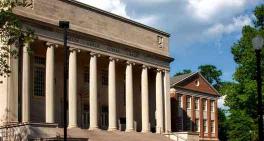Trump travel ban is focus of Supreme Court's last arguments
Law Journals
President Donald Trump's ban on travelers from several mostly Muslim countries is the topic of arguments Wednesday at the Supreme Court, with a Trump administration lawyer facing questions during the first half of arguments.
The travel ban case is the last case the justices will hear until October.
A little over 20 minutes into arguments, Justice Anthony Kennedy asked Solicitor General Noel Francisco, who was defending the ban, whether statements Trump made during the presidential campaign should be considered in evaluating the administration's ban. Francisco told the justices that they shouldn't look at Trump's campaign statements, which included a pledge to shut down Muslim entry into the U.S.
But Kennedy, whose vote is pivotal in cases that divide the court along ideological lines and whose vote the administration will almost certainly need to win, pressed Francisco on that point. Speaking of a hypothetical "local candidate," he asked if what was said during the candidate's campaign was irrelevant if on "day two" of his administration the candidate acted on those statements.
The Trump administration is asking the court to reverse lower court rulings striking down the ban. The policy has been fully in effect since December, but this is the first time the justices are considering whether it violates immigration law or the Constitution.
The court will consider whether the president can indefinitely keep people out of the country based on nationality. It will also look at whether the policy is aimed at excluding Muslims from the United States.
People have been waiting in line for a seat for days, and on Wednesday morning opponents of the ban demonstrated outside the court holding signs that read "No Muslim Ban. Ever." and "Refugees Welcome," among other things. In another sign of heightened public interest, the court is taking the rare step of making an audio recording of the proceedings available just hours after the arguments end. The last time the court did that was the gay marriage arguments in 2015.
Related listings
-
Courts weighing numerous challenges to political boundaries
Law Journals 04/26/2018The U.S. Supreme Court is scheduled to hear arguments Wednesday on a lawsuit alleging partisan gerrymandering in the drawing of a Maryland congressional district. Eight years after the 2010 Census provided the basis for legislative redistricting, sev...
-
French court issues mixed ruling in Facebook nudity case
Law Journals 04/16/2018A French court ruled Thursday that Facebook failed to fulfill its contractual obligations by closing without prior notice the account of a user who posted a photo of a famous 19th century nude painting.But the Paris civil court also refused to order ...
-
High court: Held immigrants can't get periodic bond hearings
Law Journals 03/16/2018The Supreme Court ruled Tuesday that immigrants the government has detained and is considering deporting aren't entitled by law to periodic bond hearings.The case is a class-action lawsuit brought by immigrants who've spent long periods in custody. T...

New Rochelle, New York Personal Injury Lawyers
If you or a loved one has been injured in an accident, contact Kommer, Bave & Ollman, LLP, in New Rochelle, New York, immediately. We can answer all your questions and work with you to determine if you have the grounds for a personal injury lawsuit. The attorneys at our firm are determined to resolve even the most difficult of cases. We will work closely with you to determine the best course of action to get your claim or case resolved in the most efficient way possible. We will fight for your right to compensation! No one should have to suffer a financial burden from the result of another person’s carelessness. The attorneys at Kommer, Bave & Ollman, LLP will aggressively fight to ensure that justice is served on your behalf.




